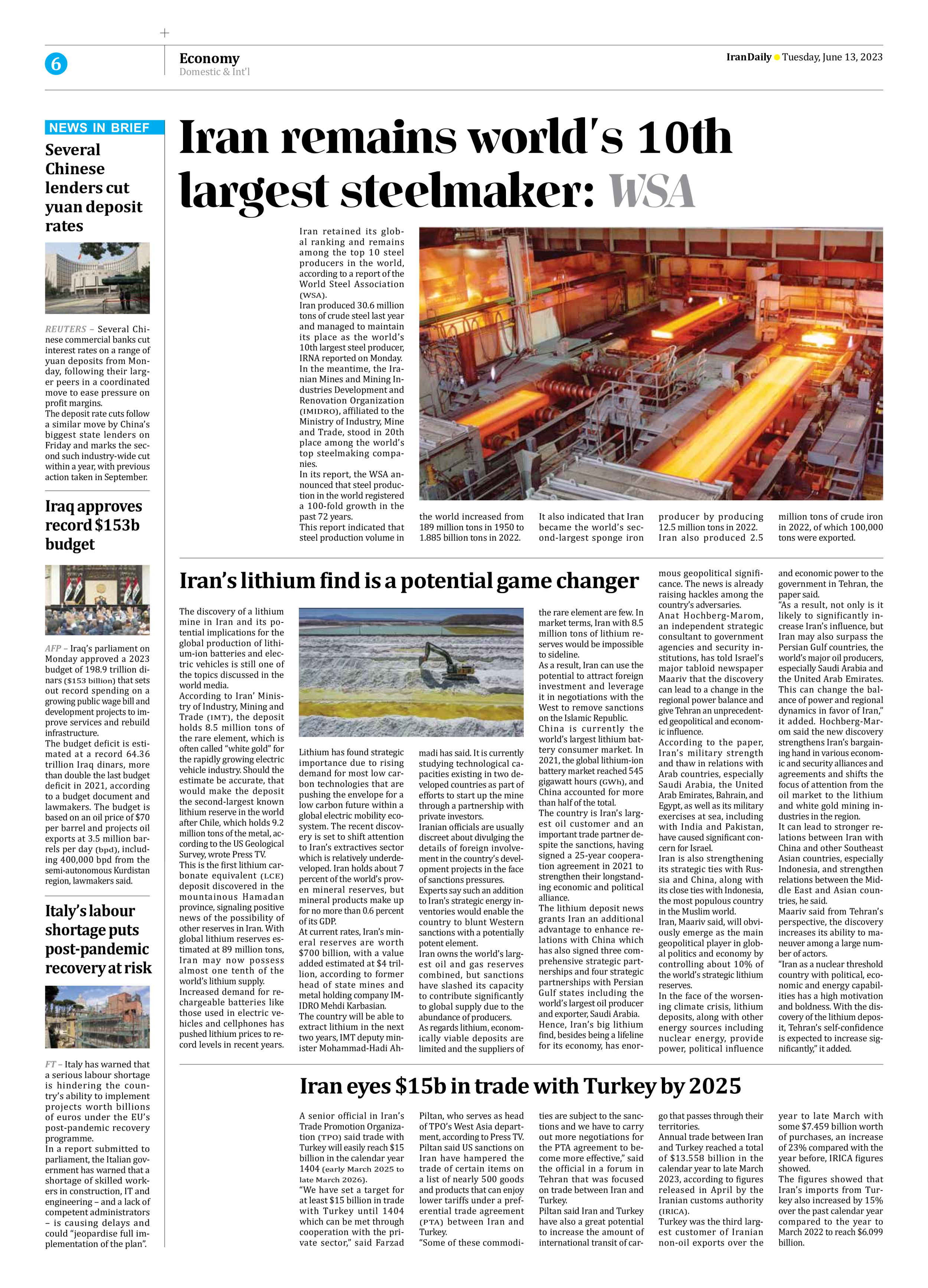
Iran’s lithium find is a potential game changer
The discovery of a lithium mine in Iran and its potential implications for the global production of lithium-ion batteries and electric vehicles is still one of the topics discussed in the world media.
According to Iran’ Ministry of Industry, Mining and Trade (IMT), the deposit holds 8.5 million tons of the rare element, which is often called “white gold” for the rapidly growing electric vehicle industry. Should the estimate be accurate, that would make the deposit the second-largest known lithium reserve in the world after Chile, which holds 9.2 million tons of the metal, according to the US Geological Survey, wrote Press TV.
This is the first lithium carbonate equivalent (LCE) deposit discovered in the mountainous Hamadan province, signaling positive news of the possibility of other reserves in Iran. With global lithium reserves estimated at 89 million tons, Iran may now possess almost one tenth of the world’s lithium supply.
Increased demand for rechargeable batteries like those used in electric vehicles and cellphones has pushed lithium prices to record levels in recent years. Lithium has found strategic importance due to rising demand for most low carbon technologies that are pushing the envelope for a low carbon future within a global electric mobility ecosystem. The recent discovery is set to shift attention to Iran’s extractives sector which is relatively underdeveloped. Iran holds about 7 percent of the world’s proven mineral reserves, but mineral products make up for no more than 0.6 percent of its GDP.
At current rates, Iran’s mineral reserves are worth $700 billion, with a value added estimated at $4 trillion, according to former head of state mines and metal holding company IMIDRO Mehdi Karbasian.
The country will be able to extract lithium in the next two years, IMT deputy minister Mohammad-Hadi Ahmadi has said. It is currently studying technological capacities existing in two developed countries as part of efforts to start up the mine through a partnership with private investors.
Iranian officials are usually discreet about divulging the details of foreign involvement in the country’s development projects in the face of sanctions pressures.
Experts say such an addition to Iran’s strategic energy inventories would enable the country to blunt Western sanctions with a potentially potent element.
Iran owns the world’s largest oil and gas reserves combined, but sanctions have slashed its capacity to contribute significantly to global supply due to the abundance of producers.
As regards lithium, economically viable deposits are limited and the suppliers of the rare element are few. In market terms, Iran with 8.5 million tons of lithium reserves would be impossible to sideline.
As a result, Iran can use the potential to attract foreign investment and leverage it in negotiations with the West to remove sanctions on the Islamic Republic.
China is currently the world’s largest lithium battery consumer market. In 2021, the global lithium-ion battery market reached 545 gigawatt hours (GWh), and China accounted for more than half of the total.
The country is Iran’s largest oil customer and an important trade partner despite the sanctions, having signed a 25-year cooperation agreement in 2021 to strengthen their longstanding economic and political alliance.
The lithium deposit news grants Iran an additional advantage to enhance relations with China which has also signed three comprehensive strategic partnerships and four strategic partnerships with Persian Gulf states including the world’s largest oil producer and exporter, Saudi Arabia.
Hence, Iran’s big lithium find, besides being a lifeline for its economy, has enormous geopolitical significance. The news is already raising hackles among the country’s adversaries.
Anat Hochberg-Marom, an independent strategic consultant to government agencies and security institutions, has told Israel’s major tabloid newspaper Maariv that the discovery can lead to a change in the regional power balance and give Tehran an unprecedented geopolitical and economic influence.
According to the paper, Iran’s military strength and thaw in relations with Arab countries, especially Saudi Arabia, the United Arab Emirates, Bahrain, and Egypt, as well as its military exercises at sea, including with India and Pakistan, have caused significant concern for Israel.
Iran is also strengthening its strategic ties with Russia and China, along with its close ties with Indonesia, the most populous country in the Muslim world.
Iran, Maariv said, will obviously emerge as the main geopolitical player in global politics and economy by controlling about 10% of the world’s strategic lithium reserves.
In the face of the worsening climate crisis, lithium deposits, along with other energy sources including nuclear energy, provide power, political influence and economic power to the government in Tehran, the paper said.
“As a result, not only is it likely to significantly increase Iran’s influence, but Iran may also surpass the Persian Gulf countries, the world’s major oil producers, especially Saudi Arabia and the United Arab Emirates. This can change the balance of power and regional dynamics in favor of Iran,” it added. Hochberg-Marom said the new discovery strengthens Iran’s bargaining hand in various economic and security alliances and agreements and shifts the focus of attention from the oil market to the lithium and white gold mining industries in the region.
It can lead to stronger relations between Iran with China and other Southeast Asian countries, especially Indonesia, and strengthen relations between the Middle East and Asian countries, he said.
Maariv said from Tehran’s perspective, the discovery increases its ability to maneuver among a large number of actors.
“Iran as a nuclear threshold country with political, economic and energy capabilities has a high motivation and boldness. With the discovery of the lithium deposit, Tehran’s self-confidence is expected to increase significantly,” it added.







